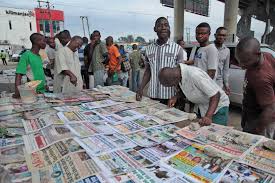11:37 PM Why Nigeria's Media Can’t Stay Neutral in Politics |

In a democracy, the media should be a neutral observer—a mirror reflecting truth, regardless of who holds power. But in Nigeria, neutrality is rare. The nation's press has become entangled in politics, with many journalists caught between truth-telling and appeasement. The consequences? Misinformed citizens, weakened accountability, and a democracy under strain. At the center of this storm is political corruption in Nigerian journalism—a force that shapes headlines more than facts do. The Myth of Media Neutrality in NigeriaWhen Every Outlet Picks a SideTrue neutrality in Nigerian journalism is becoming increasingly difficult. Most major outlets are either directly owned by politicians or heavily influenced by them. Editorial lines are drawn not around facts, but political loyalty. The result? Polarized reporting that favors factions over the public good. Ownership Bias: The Silent InfluenceBehind Every Newspaper Is a KingmakerMedia proprietorial interference plays a pivotal role in eroding neutrality. Owners with political ties use their platforms to protect allies and punish opponents. Editors are often pressured to run or kill stories depending on who’s involved—not what’s true. Brown Envelope Journalism Tips the ScalesBribes That Shape the NarrativeReporters paid under the table are less likely to remain impartial. Through brown envelope journalism, the media becomes a tool for propaganda, rewarding coverage that flatters and suppressing dissenting voices. Survival vs. Integrity: A Financial DilemmaWhen Ethics Don't Pay the BillsMany Nigerian media houses rely heavily on government advertising and patronage for survival. Criticizing the hand that feeds them is often off the table. This creates a dangerous trade-off: stay afloat, or stay ethical—but rarely both. Political Pressure and Self-CensorshipFear Silences Even the BoldJournalists who dare to challenge the political establishment often face intimidation, job loss, or physical threats. Over time, this has created an environment of self-censorship, where neutrality is abandoned not out of choice, but out of fear. The Nigerian Press Council’s Inadequate RoleNo Real OversightThe Nigerian Press Council is meant to protect journalistic ethics—but it lacks enforcement power, independence, and public trust. It cannot enforce neutrality when it’s seen as politically compromised itself. How Public Trust Is ErodedWhen Bias Replaces BalanceCitizens increasingly view the media through partisan lenses. Stories are judged by who benefits from them—not by their accuracy. This loss of trust fractures society and weakens the role of journalism in democratic checks and balances. Examples of Media Bias in Nigerian Politics
Can Nigerian Media Regain Neutrality?It’s Difficult, But Not Impossible
ConclusionNeutrality in Nigerian journalism is no longer the norm—it’s a rarity. Political pressure, financial vulnerability, and institutional weakness have left many newsrooms unable to tell the full story. But neutrality isn’t a luxury; it’s a necessity for democracy. Without it, the media becomes an accomplice to power—not a check on it. The path forward requires courage, reform, and a public that demands better. |
|
|
| Total comments: 0 | |